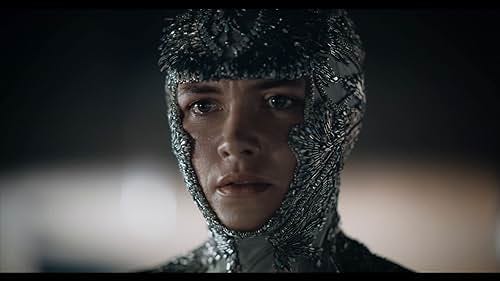How To Blow Up A Pipeline
Review | Dune: Part 2
I think you are another of these desert-loving English: Doughty, Stanhope, Gordon of Khartoum. No Arab loves the desert. We love water and green trees, there is nothing in the desert. No man needs nothing.
— Alec Guinness, Lawrence of Arabia
In the opening of his groundbreaking science fiction novel “Dune,” Frank Herbert, through the voice of Princess Irulan, advises the reader how best to understand Muad’Dib. “To begin your study of the life of Muad'Dib,” we’re told, “take care that you first place him in his time [and] place.” So too must every attempt to adapt DUNE consider the time and place of its audience. Indeed, it’s the job of every adaptation to fit its story to its audience. And just as the costumes and haircuts need to fit the style of the movie’s moment, so too much the story.
And so it is with the DUNE: PART TWO, the newest installment in what increasingly seems like Denis Villeneuve’s Dune Trilogy. More than its predecessor, PART TWO goes out of its way to ingratiate Paul Atreides to the audience. But while the hero of the film may come across as a sympathetic protagonist or even a Messiah, the truth is that Villeneuve cannot resist the dramatic conceit of the classic epic trilogy. Just as THE EMPIRE STRIKES BACK or THE TWO TOWER ends on a down note, DUNE: PART TWO wraps up with the hero completely over taken by evil. But unlike those other films, Paul — just like the audience — may not even understand the evil that is lying in wait.
In an early scene of DUNE (2021), Paul Atreides (Timothée Chalamet) is shackled by personal conflict. He is the son of a Duke, and stands to inherit his father’s titles and claims. But he doubts whether he can be an effective ruler. As he walks amongst the graves of his ancestors, he confesses to his father Duke Leto (Oscar Isaac) that he doubts his own ability to lead. A sympathetic Leto tells him that he will come to the task in his own way. And even if he doesn’t, the Duke will still love him unconditionally.
Nothing could be farther from Herbert’s novels. Indeed, the books are written to relocate medieval Europe to space. And no Marquess would ever deny his father’s claim. Indeed in Herbert’s novels, Paul doesn’t. He enthusiastically backs his father at every turn. He joins war councils. He debates notable merchants at the banquet table. He even makes proclamations in his father’s name. This is a far cry from the passive and altogether anguished Paul we see in Villeneuve’s movies.
But perhaps Paul Atredies deserves anguish. Because, indeed, he eventually finds his way towards leadership in DUNE: PART TWO. At the start of the movie Paul knows that the Fremen will start an intergalactic holy war in his name. But he desperately wants to avoid it. We watch as he tries to opt out of the trek to the South, where the most fanatical Fremen tribes live. But eventually Leto’s call for Desert Power gives way, and Paul summons the southern tribes as their savior.
In the book, Muad’Dib accepts his role as the Fremen messiah, the Lisan al Gaib, as easily as he accepts the role of Duke of Arrakis. He’s not some existential waif preoccupied by the impact of inter galactic legacy. He’s a man’s son. And his duty obliges him to blindly extend that man’s legacy. By introducing moral trepidation, Villeneuve risks tipping Paul over from “frustrated teen I can feel bad for” to “petulant leader of a crusade.”
Which perhaps brings us back to the legacy of science fiction PART TWOs. Because DUNE: PART TWO ends with Paul failing the test he has set for himself. After spending the entire film fighting the urge to become the messianic figure the Fremen need, thus cultivating the ultimate desert power, Paul initiates the Holy War.
For Book Paul, this wouldn’t have been a problem. He would’ve strapped on the turbo-thrusters the first chance he got, and rocked the cosmos to smithereens. And, to be honest, we wouldn’t have really blamed him for it.
But movie Paul? That devilish little worm-rider knows better. And when he gives in to his dark temptations, our hearts break. He’s become a creature of the system. He’ll never come back from that brink. He has seen the desert, and he knows that he can rule its wastes.
Make no mistake, there is a reason he loves the desert. Dune is his home.




